Tips to Teach Your Parrot to Talk
One of the main reasons that many people choose to get a parrot is their ability to talk. But, just like a human child, parrots must be taught to talk. This can be a daunting task for new bird owners who do not have experience in animal training. However, speech can be taught fairly easily as long as you are consistent and knowledgeable.
First, you should familiarize yourself with your parrot’s breed. African Greys and Amazon parrots are thought to be the best talkers in the parrot world. These two breeds are able to use words and sentences. They have been known to use them to communicate rather than mimic. Owners have reported their African Greys and Amazons asking questions, naming objects and places, counting, making requests, and even expressing emotions.
Macaws and Cockatoos, on the other hand, are only able to learn a few short sentences and words. Of course, every bird is different and there are some exceptions. But, these breeds are usually not the best talkers. They certainly are not as communicative with their language skills.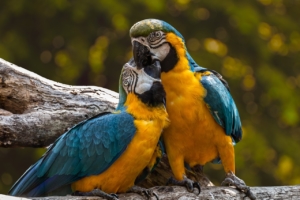
All breeds of parrots can learn how to talk to some degree, but the level of their language use and comprehension will depend on the bird and your training. You can greatly improve a bird’s language skills by following this simple guide and staying consistent.
Start Teaching your parrot to talk sooner than later
Just like humans, parrots have a learning period in their infancy that is thought to be ideal for language skills to be taught. If you are able to, start teaching your parrot words as young as possible. Baby parrots often mimic sounds in their environment just by listening to them. Encourage mimicry whenever you can, and stimulate your bird by playing the radio or TV for them.
Be a good example
Use basic 1-3 syllable words, repeated often and consistently. This will help your parrot associate the words you are using with the objects or situations that are relevant. Speak slowly and clearly so your bird can hear the nuances of your words.
Start by greeting your bird each morning or another time you consistently interact with your bird. Phrases like “Hi”, “Hello,” or “Good Morning” are ideal as they are simple and make it easy for you to remain consistent. This will establish a routine that your bird will want to mimic. After a while, you’ll notice that your bird might start using this phrase before you get the chance.
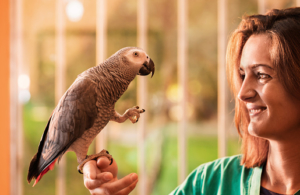
Remember, the best way to encourage speech is by showing your bird how to use language as often as you can. Talk to your bird when you are interacting with them. Think of how you would talk to a baby, use that as a guideline for your parrot.
Be expressive
Since parrots are naturally musical creatures that whistle and communicate in song, using an expressive voice will keep your bird interested. Make words and phrases sound interesting and musical by using tone and facial expressions. Put emphasis on certain words, raise and lower your pitch, and repeat words.
For example “Who is a PRETTY bird?” with emphasis on “pretty” will help your bird understand the keyword of the question you are asking is “pretty.” The varying tone will make your bird curious and encourage him to answer you.
Have patience
Young parrots will squeak and whistle just like a baby will babble and coo. You should never discourage your bird from making these noises since some of them will be lifelong noises that queue you in on what your bird is feeling. It could also be your bird’s way of experimenting with their voice, trying to replicate sounds they hear around them.
Use word association
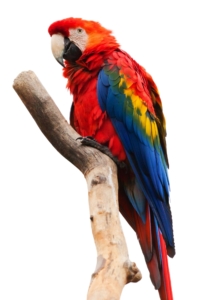
One of the best ways to develop language skills is by helping your bird to associate sounds, words, and phrases with objects or situations. Treats can be especially useful for this technique. For example, when feeding your bird an orange say, “Want an ORANGE?” Emphasis on the word “orange” will tell your bird that the keyword is “orange.” The association of the treat with this word will encourage your bird to mimic the word in the hopes it will result in another serving.
Use praise and rewards
Always reward independent language use. If your bird uses the proper words to request a treat, give him that treat. This will further help your bird associate these words with the specific object they refer to. It will also encourage him to keep learning more to get more of what he wants. Rewards make talking a positive experience for your bird.
Location is key
To best help your bird hear constant communication and noises that can be mimicked, keep your bird’s cage in a spot that is near people when your bird is awake. Some parrot owners wonder why their bird hardly ever takes the opportunity to talk but their bird’s cage is kept in a separate space all day.
Even if you aren’t talking all day, having your bird close to you will allow your bird to hear the noises of your life and attempt to mimic them. Hearing the sounds of cooking, the radio, or other pets can be very beneficial to language development.
Also, keeping a bird alone in a separate area of your home can lead to behavioral problems such as feather plucking. And by watching your bird closely, you will be able to seek out the best times for learning.
Choose the right time
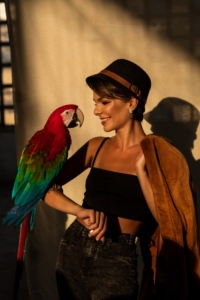
Just like you probably don’t want to get into a serious conversation when you are trying to go to bed, your parrot feels the same way. Parrots are usually more vocal in the mornings and evenings, so you should initiate speech training during those times. This will give the best results.
Be aware of your bird’s attitude and behavior in these training sessions. If your bird seems agitated or quiet, he might be having an off day, and forcing him to talk will not foster a happy learning environment. Try to fit your schedule around your birds for the best results with speech development.
Some parrots will be able to talk much more fluently and faster than other birds. This all depends on their willingness to learn and the personality of the bird. Do not get discouraged if your bird is taking longer to learn than you expected. Keep a consistent and positive learning routine and your bird will likely pick up on it. If you are really struggling to get your bird to speak, consider hiring an aviary trainer to help you.
Improve indoor air quality for you and your pets with CritterZone – an air purifier for pets and pet odor eliminator.

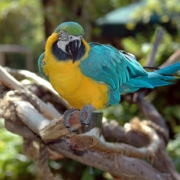

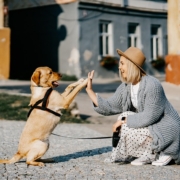



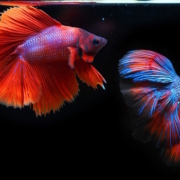



Leave a Reply
Want to join the discussion?Feel free to contribute!